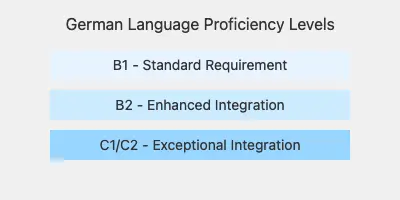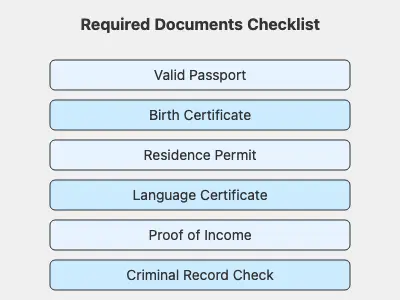Applying for German citizenship can be a complex process, especially with the recent changes in the citizenship law. To help you navigate this journey successfully, we’ve compiled a list of common mistakes to avoid when applying for German citizenship.
1. Not Understanding the New Citizenship Law
One of the biggest mistakes you can make is not being aware of the recent changes in German citizenship law. The new law, which came into effect in 2023, has made significant changes to the naturalization process.
Key changes include:
- Reduction of the required residence period from 8 years to 5 years (or 3 years in case of special integration achievements)
- Allowing dual citizenship for all applicants
- Simplifying language requirements for older applicants and those with integration achievements
To avoid this mistake, make sure you’re well-informed about the current requirements and provisions of the new law.
2. Overlooking Language Proficiency Requirements
Language proficiency is a crucial aspect of the citizenship application. Many applicants underestimate the importance of meeting the required German language level.

The standard requirement is B1 level proficiency. However, demonstrating higher levels (B2 or C1) can be beneficial and may even reduce the required residence period. Don’t neglect your language studies, and consider taking recognized language courses to improve your proficiency.
3. Failing to Meet the Financial Self-Sufficiency Requirement
Another common mistake is not meeting the financial self-sufficiency requirement. Applicants must demonstrate that they can support themselves and their dependents without relying on social welfare benefits.
Ensure you have:
- Stable employment or a reliable source of income
- Adequate savings or assets
- Proper health insurance coverage
Keep all relevant financial documents organized and up-to-date.
4. Incomplete or Inaccurate Documentation
Many applications are delayed or rejected due to incomplete or inaccurate documentation. Here’s a checklist of essential documents:

Ensure all your documents are complete, accurate, and properly translated if they’re not in German. Double-check everything before submission to avoid unnecessary delays.
5. Ignoring the Citizenship Test
The citizenship test is a crucial part of the German naturalization process. Some applicants underestimate its importance or fail to prepare adequately. The test covers various aspects of German life, including:
- History
- Culture
- Legal system
- Social norms
Don’t make the mistake of neglecting your preparation for this test. Study materials are widely available, and many communities offer preparatory courses.
6. Misunderstanding Dual Citizenship Rules
With the new law allowing dual citizenship for all applicants, there’s still confusion about the rules. Some common misconceptions include:
- Thinking you must give up your original citizenship (no longer required)
- Assuming all countries allow dual citizenship (check your home country’s laws)
- Not informing your home country about acquiring German citizenship (may be required)
Make sure you understand both German and your home country’s stance on dual citizenship to avoid any legal complications.
Applying for German citizenship is a significant step that requires careful preparation and attention to detail. By avoiding these common mistakes and staying informed about the new citizenship law, you’ll be well on your way to becoming a German citizen. Remember, when in doubt, seek advice from official sources or qualified legal professionals specializing in immigration law.
Good luck with your citizenship journey!



